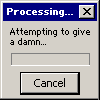anonymous attributes
If morality is subjective then by definition, you cannot trust governments, nor scientists/evolution, nor you, or me without having faith in that thing or person unless you have looked under the microscope yourself.
It is illogical then for those ones to teach that faith is only with the religious ones.
Morality is subjective, yes. Such concepts are. Right and wrong are subjective. But you can see that some things are correct, and some aren't. Because of something called a conscience.
arrow I can trust scientists and evolution and have 'faith' in them because the amount of evidence and research is extensive. There are literal centuries and piles upon piles upon piles of evidence.
I don't need to look under the microscope myself--there are people better qualified than I who have taken the time to look, and record their findings and travelled the world, and are even out in space. Proof for evolution and for a naturalist worldview is more than convincing. It simply cannot be denied.
arrow So, there is a difference between the quasi servile faith of the religious and the critical trust of those of us who ascribe to a scientific worldview.
arrow I cannot trust governments because they are corrupt. They do not have our best interests in mind. They are led by the lowest of the low. By the most duplicitous, dirty douchebags.
arrow The kind of 'faith' that science teaches is one you can test for yourself----not one you have to simply follow without any thought.
 100
100
 100
100
 100
100

